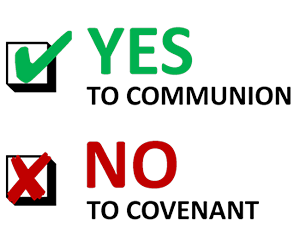The Ratification of the Conventions of nine States, shall be sufficient for the Establishment of this Constitution between the States so ratifying the Same.On June 21, 1788, the ninth state, New Hampshire, ratified the Constitution. March 4, 1789, was chosen as the day the new goverment would be established. (Perhaps we should celebrate March 4 with the same enthusiasm that we demonstrate for July 4.) All the states eventually ratified the Constitution, although the last one, Rhode Island, did not do so until May 29, 1790.
I mention these facts to make comparisons with adoption procedures for the Anglican Covenant. The final text of the Covenant was announced on December 17, 2009. The Covenant includes a whole section (4.1) on adoption, but the relevant paragraph for our purposes is 4.1.6:
This Covenant becomes active for a Church when that Church adopts the Covenant through the procedures of its own Constitution and Canons.The relationship of the United States to the Constitution in 1787 is similar to that of the Anglican Communion to the Anglican Covenant in 2009. In each case, an organization was in place that some people thought was inadequate. In each case, there was a plan to replace existing structures with new ones. One might even say that the purpose of each proffered document was to intensify relationships among the entities being asked to embrace it.
What is different about the approval process for the Constitution and that for the Anglican Covenant is that the framers of the Constitution sought a unity that could not be assumed as a given. They knew their document would be a hard sell, and they wanted to avoid creating a more fractured union by having it apply at any time to only a small minority of states but not to others. Only when two-thirds of the states ratified the Constitution would it go into effect.
The drafters of the Anglican Covenant, on the other hand, naïvely assumed that all churches would be eager to adopt the document, or thought it urgent that it at least some churches embrace it, or didn’t really care at all if churches such as the American and Canadian ones chose to opt out. In other words, the vaunted commitment to unity among Covenant backers was either mindless or insincere.
It would have made more sense had, for example, adoption by 26 of the 38 Anglican churches been required for the Covenant to go into effect. It would also have been wise to put a time limit on the adoption period. Although this was not done for the U.S. Constitution, it has become standard for the ratification of new amendments to the Constitution. It makes sense, after all, for the required acquiescing super-majority to express its acceptance more or less concurrently.
Alas, the odd ratification procedures used for the Anglican Covenant have already created a two-tier Communion of covenanting and, at the very least, yet-to-be-covenanting churches. (Lacking a deadline for adoption, it is unclear that any church can ever be said to have definitively rejected the Covenant.) This is hardly a formula to promote unity.
Assuming that few churches actually adopt the Anglican Covenant—this now seems possible, perhaps even likely—how will we restore unity to the Community by undoing the adoptions that have already been effected? How much time and energy will be expended on the process?

Well reasoned and on point. The ratification process is like most of section 4, ill conceived and ill expressed.
ReplyDeleteThis may be a slightly silly analogy, but the Covenant might be thought of as something like the Order of the Arrow in the Boy Scouts, yes? All Scouts are Scouts, as "all Anglicans are in the Anglican Communion," but some choose to live their Scouting lives in a more intense and committed way, with a higher degree of accountability. All Anglican Provinces could choose to live in the kind of relationship described in the Covenant, but none must. Those adopting create a subset, perhaps. Accepting responsibilities and receiving the benefits of enhanced relationship. Those who don't perceive the benefits of enhanced relationship to be "worth" the effort of the additional responsibilities may simply continue to live in the "Anglican but non-Covenant" section of the room. It is perhaps the hope that as a smaller number of Provinces enter into the relationship defined by the Covenant, some of those who were initially reluctant might eventually choose to reconsider. On the other hand, it may be that those Provinces that initially agree to the Covenant will find that the enhanced life hoped-for doesn't emerge.
ReplyDeleteProof of pudding will be in the eating, and I suspect that will take some years to sort out.
Bruce Robison
Bruce,
DeleteYou raise some interesting points. In fact, it is not clear how the Covenant will work in practice. (I expect to have more to say about this in another essay.) Reading the Covenant, one does not necessarily see the same future for the Communion as, for example, Rowan Williams seems to see. What, in fact, does the second tier look like? It could be a place of refuge in an otherwise turbulent Communion. It could also be place of isolation, a kind of solitary confinement. Or perhaps, it could be something else. The drafters of the Covenant did not, I think, give much thought to the non-covenanting churches.
No, I don't think they did. Probably not in their sphere of concern. I would think "Non-Covenanting Churches" might want to do that work. Perhaps to develop for themselves a more acceptable model of shared life--or perhaps simply to articulate what "Anglicanism Outside the Covenant" might look like aspirationally.
ReplyDeleteBruce Robison